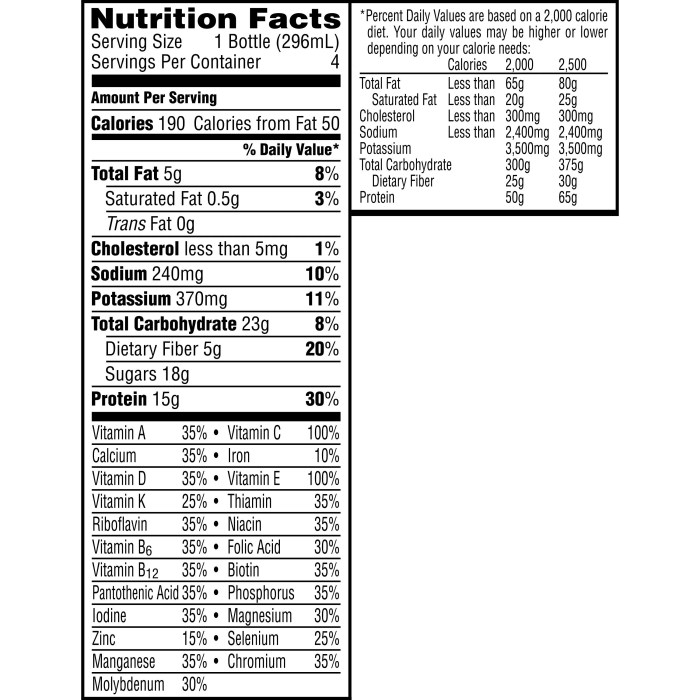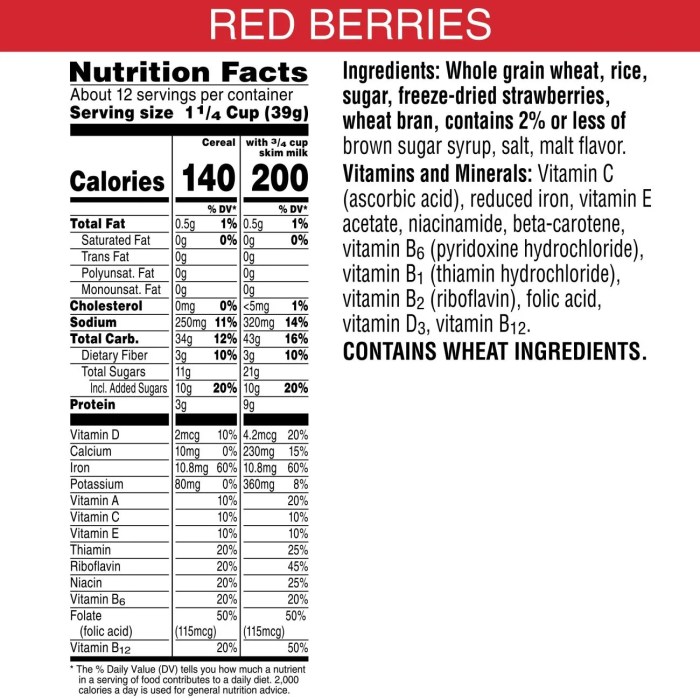Micronutrient Profile

Special k cereal nutrition facts – Understanding the micronutrient content of breakfast cereals like Special K is crucial for making informed dietary choices. Micronutrients, including vitamins and minerals, play vital roles in various bodily functions, contributing to overall health and well-being. A balanced intake of these essential nutrients is vital for optimal energy levels, immune function, and overall health.Special K, like many fortified breakfast cereals, aims to supplement the nutritional value of the base grains with added vitamins and minerals.
However, it’s important to remember that cereal should be part of a balanced diet, and not relied upon as the sole source of these essential nutrients.
The seemingly virtuous Special K, with its touted nutritional profile, can be a deceptive siren. A closer look reveals a reality far removed from the idyllic image, a stark contrast to the caloric complexities unveiled by exploring the olive garden nutrition facts , a landscape of creamy sauces and carb-laden delights. Ultimately, however, the deceptive nature of seemingly “healthy” breakfast cereals like Special K highlights the crucial importance of careful scrutiny of all nutrition labels.
Key Vitamins and Minerals in Special K and Their Benefits
The following vitamins and minerals are commonly found in Special K and contribute to various aspects of health. It’s important to consult the specific nutrition label of your chosen Special K variety, as the exact amounts may vary slightly. These benefits are general and may not apply to every individual.
- Iron: Essential for red blood cell production and oxygen transport throughout the body. Iron deficiency can lead to anemia, resulting in fatigue and weakness. Recommended daily intake varies depending on age and sex.
- B Vitamins (Thiamin, Riboflavin, Niacin, B6, B12, Folic Acid): These vitamins are crucial for energy metabolism, nerve function, and red blood cell formation. Deficiencies can lead to various health problems, including fatigue, nerve damage, and anemia.
- Vitamin D: Important for calcium absorption and bone health. Vitamin D deficiency can lead to weakened bones and an increased risk of fractures. Sunlight exposure is a major source, but many people benefit from supplementation.
- Vitamin E: A powerful antioxidant that protects cells from damage caused by free radicals. It contributes to immune function and overall health.
- Zinc: Plays a role in immune function, wound healing, and cell growth. Zinc deficiency can weaken the immune system and impair growth.
- Calcium: Essential for building and maintaining strong bones and teeth. Adequate calcium intake is crucial throughout life, especially during childhood and adolescence.
Visual Representation of Micronutrient Content, Special k cereal nutrition facts
The following text-based representation provides a simplified overview of the micronutrient profile. Remember that actual values vary depending on serving size and specific product variations.* High: Iron, B Vitamins
Moderate
Vitamin D, Vitamin E, Zinc, Calcium
Low/Trace
Other micronutrients may be present in trace amounts.
Comparison to Other Fortified Breakfast Cereals
Special K’s micronutrient profile is comparable to many other fortified breakfast cereals, but variations exist. Direct comparisons require analyzing the nutrition labels of specific competing brands.
- Iron Content: Many fortified cereals contain similar amounts of iron to Special K, aiming to meet a significant portion of the recommended daily intake.
- B Vitamins: The B vitamin content is generally similar across many fortified cereals, although the specific amounts of each B vitamin may differ.
- Added Sugars: A key difference among cereals is the added sugar content. Some cereals may contain significantly more added sugar than Special K.
- Fiber Content: Fiber content can vary widely between different cereals. Some cereals might offer a higher fiber content than Special K.
Special K and Dietary Considerations: Special K Cereal Nutrition Facts

Special K, like any breakfast cereal, fits into a balanced diet in various ways, depending on individual dietary needs and goals. Understanding its nutritional profile is crucial for making informed choices about its inclusion in your eating plan. This section will explore the suitability of Special K for different dietary approaches and provide guidance on its effective integration into your meals.
Special K’s Suitability for Various Diets
The suitability of Special K for various diets depends heavily on the specific variety chosen (e.g., original, protein, etc.) and portion size. Always check the nutrition label for accurate information.
- Low-Sugar Diets: While some Special K varieties are marketed as lower in sugar than other cereals, it’s important to check the sugar content per serving. Many versions still contain added sugars, so individuals strictly limiting sugar intake may need to consider alternatives or consume smaller portions.
- Low-Carb Diets: Special K’s carbohydrate content is relatively moderate compared to some other cereals. However, individuals on very low-carb diets may need to carefully monitor their intake and consider options with fewer carbohydrates per serving. The presence of refined grains should also be considered within the context of a low-carb diet.
- High-Protein Diets: Special K is not a significant source of protein. Individuals aiming for a high-protein diet should supplement Special K with other protein-rich foods, such as eggs, Greek yogurt, or nuts, to meet their daily protein requirements. Special K Protein varieties offer a slightly higher protein content but should still be combined with other protein sources.
Benefits and Drawbacks of Incorporating Special K into a Balanced Diet
Incorporating Special K into a balanced diet presents both advantages and disadvantages. Careful consideration of these aspects is crucial for making informed dietary choices.
- Benefits: Special K can provide a convenient and relatively quick breakfast option. Some varieties offer added vitamins and minerals. It can be a source of fiber, contributing to digestive health (though the amount varies between varieties).
- Drawbacks: Special K often contains refined grains, which may not be ideal for those prioritizing whole grains. The added sugars in many varieties can contribute to elevated blood sugar levels. It is typically low in protein and healthy fats, requiring supplementation with other foods to achieve nutritional balance.
Integrating Special K into Various Meal Plans
Special K can be easily integrated into various meal plans with a bit of creativity and mindful planning.
- Breakfast: A simple breakfast could involve a serving of Special K with milk (dairy or non-dairy) and a handful of berries for added antioxidants and fiber. Alternatively, it can be used as a base for overnight oats by combining it with yogurt, chia seeds, and milk.
- Snacks: Special K can be combined with nuts and seeds for a more balanced and filling snack. It can also be incorporated into homemade granola bars for a portable snack option.
- Other Meals: While less common, Special K can be creatively used in other meals. Crushed Special K can be used as a crunchy topping for yogurt parfaits or incorporated into homemade muffins for added texture.
Helpful Answers
Is Special K gluten-free?
Nah, mate. Standard Special K ain’t gluten-free.
Can I eat Special K for weight loss?
It can be part of a weight-loss plan, but it’s not a miracle worker. Portion control is crucial.
What are the best Special K varieties for high protein?
Look for the protein-enhanced versions – they usually have more protein per serving.
Does Special K contain artificial sweeteners?
Check the ingredients list – some varieties might, some might not. Read the label, innit?
